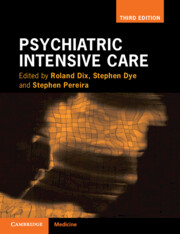Book contents
- Psychiatric Intensive Care
- Psychiatric Intensive Care
- Copyright page
- Contents
- Contributors
- Foreword
- Preface to the Third Edition
- Preface to the Second Edition
- Preface to the First Edition
- Acknowledgements
- Chapter 1 Psychiatric Intensive Care: Development and Definition
- Chapter 2 Psychiatric Intensive Care in Mental Health Secure Units
- Chapter 3 National Standards and Good Practice
- Chapter 4 Commissioning and Developing a PICU
- Chapter 5 PICU Design, Environment and Security
- Chapter 6 Team Resilience
- Chapter 7 Principles and Practice for Management of Acutely Disturbed Patients
- Chapter 8 Absconding
- Chapter 9 Substance Misuse
- Chapter 10 Fire-Setting and Arson
- Chapter 11 Sexually Problematic Behaviour in Mental Health Inpatient Units
- Chapter 12 Self-Harm and Personality Disorders in PICU
- Chapter 13 Activity and Positive Engagement within a PICU
- Chapter 14 De-escalation
- Chapter 15 Psychological Approaches to the Acute Patient in PICUs
- Chapter 16 A Social Behaviour Theory Approach to Challenging Behaviours in Psychosis
- Chapter 17 Pharmacological Therapy
- Chapter 18 Rapid Tranquillisation
- Chapter 19 The Use of Seclusion in Mental Health Care
- Chapter 20 The Practice of Restraint and Physical Intervention
- Chapter 21 Management of the Mental Health Emergency in the Community
- Chapter 22 PICU for the Care of Young People
- Chapter 23 Female-Only PICUs
- Chapter 24 The Complex Needs Patient
- Chapter 25 Psychiatric Intensive Care in General Hospital Settings
- Chapter 26 An Overview of International Perspectives on PICUs
- Index
- References
Chapter 23 - Female-Only PICUs
Published online by Cambridge University Press: 15 March 2024
- Psychiatric Intensive Care
- Psychiatric Intensive Care
- Copyright page
- Contents
- Contributors
- Foreword
- Preface to the Third Edition
- Preface to the Second Edition
- Preface to the First Edition
- Acknowledgements
- Chapter 1 Psychiatric Intensive Care: Development and Definition
- Chapter 2 Psychiatric Intensive Care in Mental Health Secure Units
- Chapter 3 National Standards and Good Practice
- Chapter 4 Commissioning and Developing a PICU
- Chapter 5 PICU Design, Environment and Security
- Chapter 6 Team Resilience
- Chapter 7 Principles and Practice for Management of Acutely Disturbed Patients
- Chapter 8 Absconding
- Chapter 9 Substance Misuse
- Chapter 10 Fire-Setting and Arson
- Chapter 11 Sexually Problematic Behaviour in Mental Health Inpatient Units
- Chapter 12 Self-Harm and Personality Disorders in PICU
- Chapter 13 Activity and Positive Engagement within a PICU
- Chapter 14 De-escalation
- Chapter 15 Psychological Approaches to the Acute Patient in PICUs
- Chapter 16 A Social Behaviour Theory Approach to Challenging Behaviours in Psychosis
- Chapter 17 Pharmacological Therapy
- Chapter 18 Rapid Tranquillisation
- Chapter 19 The Use of Seclusion in Mental Health Care
- Chapter 20 The Practice of Restraint and Physical Intervention
- Chapter 21 Management of the Mental Health Emergency in the Community
- Chapter 22 PICU for the Care of Young People
- Chapter 23 Female-Only PICUs
- Chapter 24 The Complex Needs Patient
- Chapter 25 Psychiatric Intensive Care in General Hospital Settings
- Chapter 26 An Overview of International Perspectives on PICUs
- Index
- References
Summary
When psychiatric intensive care units (PICUs) were first created in the United Kingdom, they were mixed-sex wards. As time progressed, evidence grew stronger for the need to create separate PICUs for men and women. Female-only PICUs have been around for about a decade, making them a relatively novel phenomenon within the existing mental health services in the United Kingdom. Nevertheless, they play a crucial role within the wide net of mental health services. This chapter summarises the history and development of female-only PICUs and describes some female-specific characteristics of such wards. It then focuses on describing women-specific perinatal mental health presentations and services, including existing provisions for women with mental illness to access family support and contact with their children. Lastly, it discusses the clinical considerations for patients with EUPD and ASPD to access PICU settings.
Keywords
- Type
- Chapter
- Information
- Psychiatric Intensive Care , pp. 286 - 294Publisher: Cambridge University PressPrint publication year: 2024

